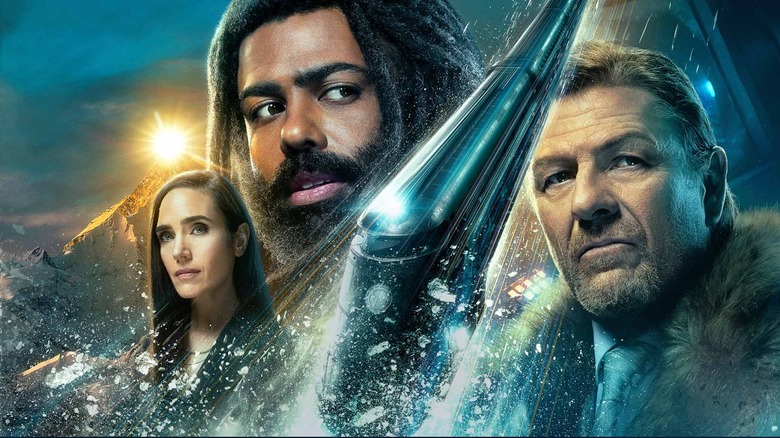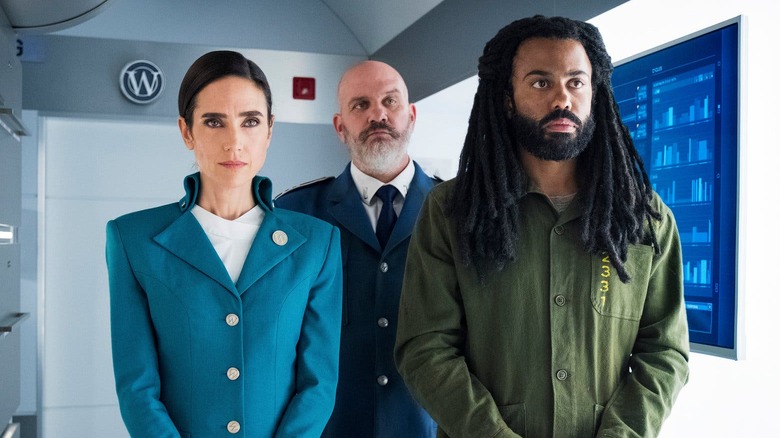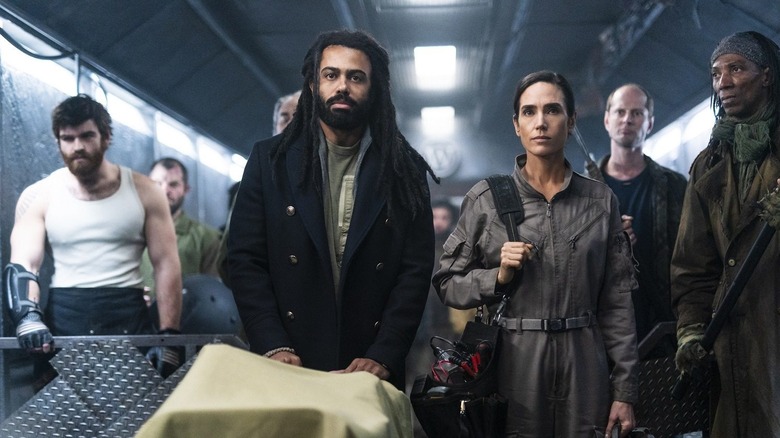The Interesting Way Snowpiercer Episode Titles Are Named
The late movie mogul Samuel Goldwyn once joked, "What makes a good movie title is a hit." The issue still leaves film and television producers tossing in their sleep wondering, "What's in a name?" The Wrap offers some insight into the naming process for movies, noting that it begins with the script and can become a years-long process. For television, the process is a bit different.
There are numerous ways TV series choose to label their episodes. "Seinfeld" — being a show about nothing — went with the basic formula of "The ___" and inserted the main subject of the episode. "The Big Bang Theory" pays homage to its content with science-related titles such as "The Griffin Equivalency."
The TNT series "Snowpiercer" is no different. The post-apocalyptic thriller is set in a future where the world is a frozen wasteland and survivors inhabit a perpetually moving train divided by class. Coming up with the show title was easy, as the series is based on the 2013 Bong Joon-ho film "Snowpiercer" and 1982 French graphic novel ("Le Transperceneige"). What formula would show creators use to name each individual episode? As it turns out, the titles serve an important purpose beyond labeling the episode.
Building characters with titles
Naming the pilot episode "First the Weather Changed" while beginning with a protagonist voiceover with the same phrase makes sense, as the episode serves as exposition for the entire series and outlines the premise of the show. Show creators decided to stick with that theme, marrying the opening narrative and episode title. Nearly all of the show's episode titles are plucked from the opening narration (the others are more telling ruminations of the episode's action to come).
As the pilot's narration explains, war and climate disaster leaves the planet frozen and uninhabitable. A visionary billionaire named Mr. Wilford builds a "great ark train" 1,001 cars long as a means for the rich to ride out the freeze. Even in the apocalypse, capitalism still rules.
Moments before departure of the train, dubbed the Snowpiercer, many without tickets board the train and are forced to live in the barren final few cars. The world of "Snowpiercer" is a reflection of society, offering an examination of human nature, class structure, and social injustice. Each episode delves into the different lives of the train passengers and the rebellion of the lower class. The train is governed by Wilford Head of Concierge Melanie Cavill (Jennifer Connelly) while the rebellion is led by former police detective Andre Layton (Daveed Diggs).
The narratives at the beginning of each episode do more than inspire a title. The inner dialogues by Cavill and Layton are philosophical, revealing the depth of their characters and that their motivations aren't that far apart. Both are doing their best to survive while looking out for the people they've been tasked to protect. The show emphasizing the opening narrations with episode titles adds another layer to the development of key characters, many of which we'd come to know more about through their own opening narrations.
It's all about the show
"Snowpiercer" drawing each episode title from the inner-thoughts of its characters gives us some insight into what we might learn about the character that episode. For example, in the season 2 premiere titled "The Time of Two Engines" (Spoiler ahead!), Layton must grapple not only with the physical addition of a new engine when Big Alice attaches to the Snowpiercer, but also deal with maintaining martial law on his own train amidst the calls for implementation of the newly-won democracy he led a rebellion for. He's being pulled in two directions, which is exactly what happens to the Snowpiercer in the episode.
While naming individual TV episodes can be a creative venture, some shows take it a step further. Season 2 of "Breaking Bad" teased a future event with flash-forwards at the beginning of several episodes. In meta fashion, show creators teased viewers even more hints using the titles themselves. Four of the show's titles gave away events from the season finale, spelling out "747 Down Over ABQ" with the episode titles.
Because television production is different than film, episode titles are needed both for creative and clarity's sake. Movies have years to come up with punchy sequel titles or to simply add "2" to the name. With series cranking out numerous episodes in a single season, individual titles are a must. They help viewers organize and compartmentalize what happens in each specific episode. For hardcore fans, they might take on more meaning. If you ask a fan of "The Office" for the best episode of the eight-season sitcom, they will likely emphatically answer, "Dinner Party!"
So, what's in a name? For television, the answer seems to lie in the heart of the show itself. Whether it's a unique character ala "Roseanne" or brevity inspired by the show's novel concept like "Seinfeld," a good episode title should allow viewers to make sense of the show, glean something beyond the episode's narrative, or even interactively piece together things to come. Or in the case of "Snowpiercer," offer a literal snippet from the show's content while emphasizing the depth of its characters.


